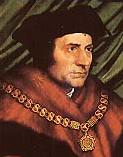
Back to alternative history
Contents
Part 1
Part 2
Part 3
Part 4
Part 5
Part 6
Part 7
|
| On His Majesty's Most Secret Service |
|---|
|
|
Thomas More and Brother Felix of Barcelona rode to Lowestoft, from where
they would take a boat to Zeebrugge and then ride to Stuttgart, the
principle city of the province of Württemberg. Stuttgart was the last
known abode of Johann Reuchlin, Catholic, humanist and linguist extra
ordinem. Reuchlin was now believed to be a captive of the heretical
terrorizers known as 'Lutherans', named after their executed former
leader.
More and Felix rode on horseback. More flatly refused to take a coach,
doubting he would ever travel that way again after the tragedy of St
Paul's. Felix had won one-and-two in a game of Canasta with More and
had used the bulk of his winnings to purchase a horse - tenpence plus a
ha'penny tax.
Austin could almost have been the brother of More's horse, Martin. The
name Austin was chosen by Felix as it was a popular English form of
'Augustine'. More had his doubts. Augustine of Hippo was claimed by
the Lutherans as a major theological influence. Maybe it was time to
remove St Austin from the calendar of saints.
Felix disagreed vehemently. St Augustine was a Doctor of the Church.
That los hereticos misinterpreted him in no way besmirched his
reputation. Mother Church must hold fast to that which was good - to
react blindly to what los Luteranos did simply gave them the victory.
The remaining thruppence-ha'penny in the friar's satchel weighed heavily
on his conscience. As soon as they reached Lowestoft, Felix vowed, he
would find some way to dispose of the money. Austin and Martin should
have them there in no time.
|
|
|
The caravel to Zeebrugge had already sailed when they reached
Lowestoft. The next would sail the following afternoon, winds
permitting. The two investigators found accommodation near the wharves
in a lodging house.
Unlike an inn the lodging house served no strong drink. Felix was
seized with inspiration as to how he might dispose of his unwanted
coins. "Wait here," he told More, "I shall return with finest sack."
More thought this a capital idea.
|
|
|
In many towns the roughest lot congregate by the docks and Lowestoft was
no exception. Three large ruffians, their hair almost cut to a tonsure,
accosted Felix.
"What is your name, Moor?"
At first Felix thought they were talking to someone else. Then the
largest of the trio pushed an open hand into Felix's chest and repeated,
"I said, what is your name, Moor?"
Felix replied with the first name that came into his head.
Big thug was not mollified. "We don't like your kind here, Roger Moor."
"What kind?" demand Felix indignantly, "I am a Catholic first and a
Spaniard second. Do you have something against Dominicans?"
"Oh, we like the Black Robes just fine," said the eldest, a man with
misshapen features, "But this is England." He pronounced it
Ing-er-land. "We don't think in this kingdom a Black Robe should have a
black face too."
Felix was shocked. Here were men who considered themselves Christian
but who had no knowledge of Christ's message of universal brotherhood.
Yet this was no time to remain shocked for as one the three moved closer
to do the Spaniard a mischief.
As an Inquisitor of some years standing, Felix had a knowledge of man's
vulnerabilities. He applied that knowledge, along with his sandal-shod
feet, to his assailants' persons. Soon three writhing bullies lay at
his feet. Throughout the fracas Tomás, the monk's misericord, remained
suspended, unused, in his belt. The sins of these miscreants were
venial, not mortal.
|
|
|
The taverner did not sell sack. This was a seaside town, where naught
but manly drinks could be bought. And the manliest drink of all was
Dutch sloe gin, sold in quart bottles. "Have you no wine at all?"
inquired Felix.
"Something for the little lady, eh? Lesse," the landlord rummaged under
the counter. He emerged holding a small green bottle, holding perhaps a
gill. "Wormwood wine from Italy. That's all we have, expecting another
shipment in any day now."
Felix's thruppence-ha'penny purchased the wine and three quarts of gin.
He returned to the boarding house without further interruption.
|
|
|
More poured a generous measure of gin into each beaker. Felix tried a
cautious mouthful. "Feh!" he spat, "It's like drinking stars."
"It is a little rough," agreed More, "We can cut it with this wormwood
wine. Just a drop! There is very little wine for so much gin." More
tasted his cocktail, "Ah! That's better."
Felix was dubious. "I wouldn't give this to your horse!"
"Martin? He might like it," the Englishman looked thoughtful, "The
concoction needs a name. Perhaps I could name it after..." he picked up
the small green bottle and read the label, "From Italy, eh? Martin,
Martini. Yes, that's the ticket!"
|
|
|
More and Felix stood at the prow of the Lady of Zeebrugge. The wind was
from the North and the waves were cresting at five feet. "Isn't this a
stirring morning!" said the friar, more as a declaration than a
question.
More did not answer in words. He was feeling shaken but not stirred.
He would have felt more shaken still if he could see the cargo in the
hold. Along with barley, turnips, and fine English beer there were some
small barrels. Barrels marked, "Wishart & Son. Cambridge-Stuttgart."
And in both English and German, "Essence of dye. This way up. Handle
with care. Keep away from naked flame."
Elsewhere in the hold, there was a whinny.
[To be continued]
|
|
|

